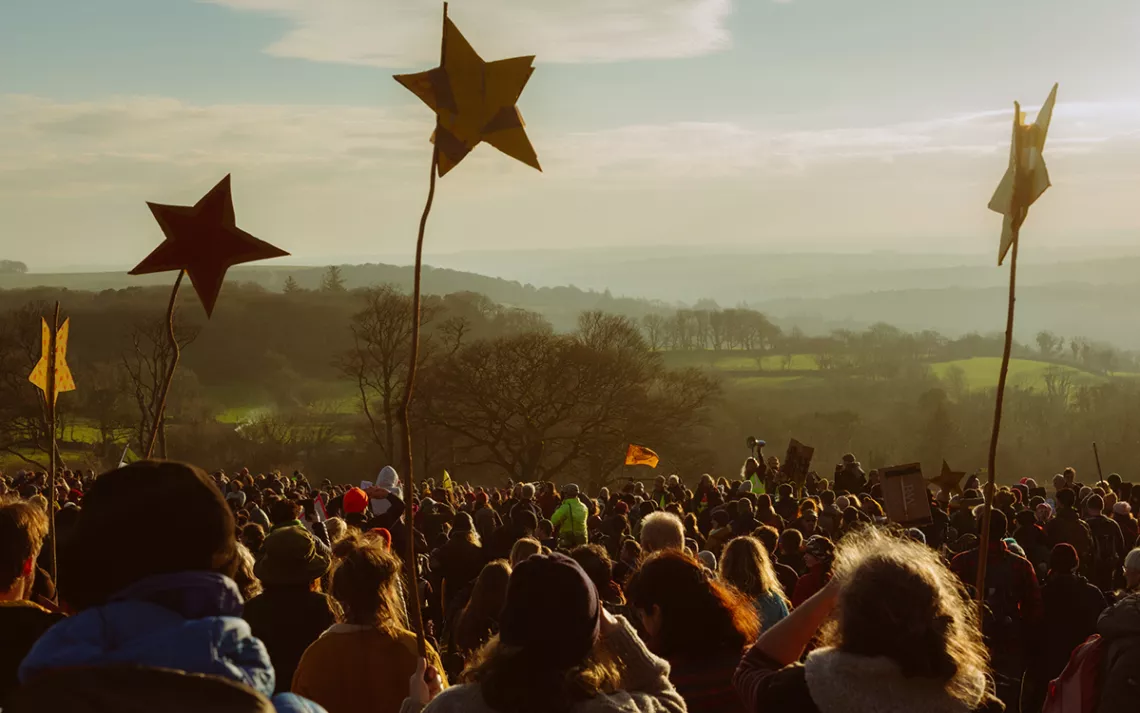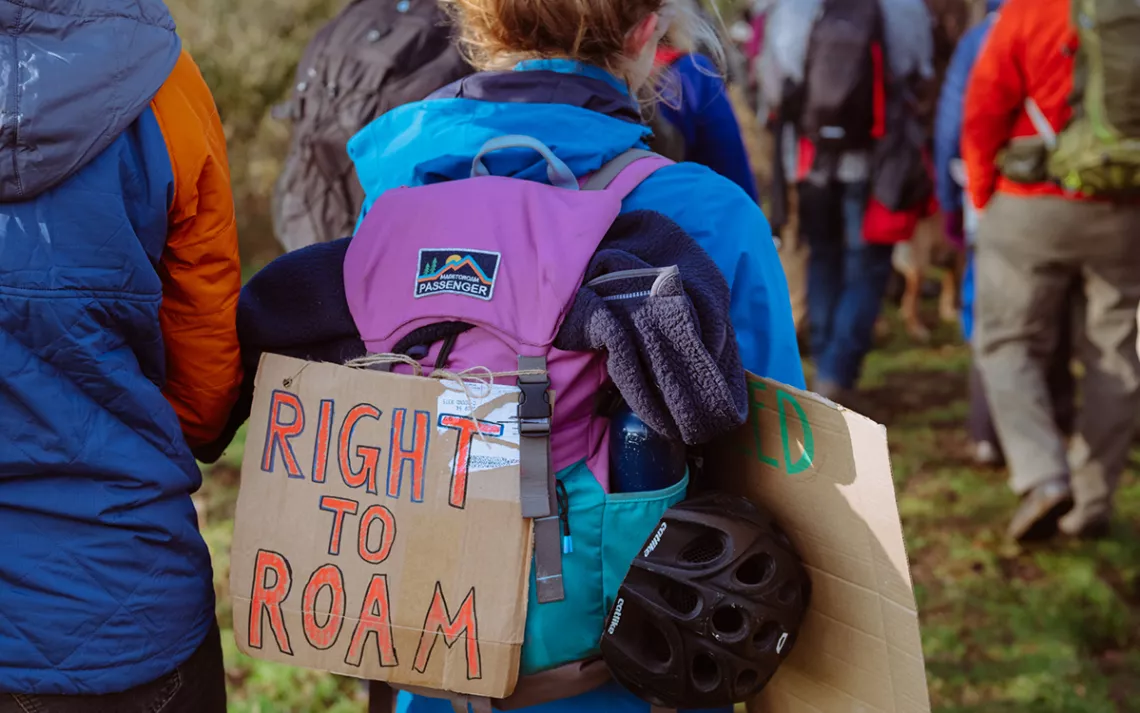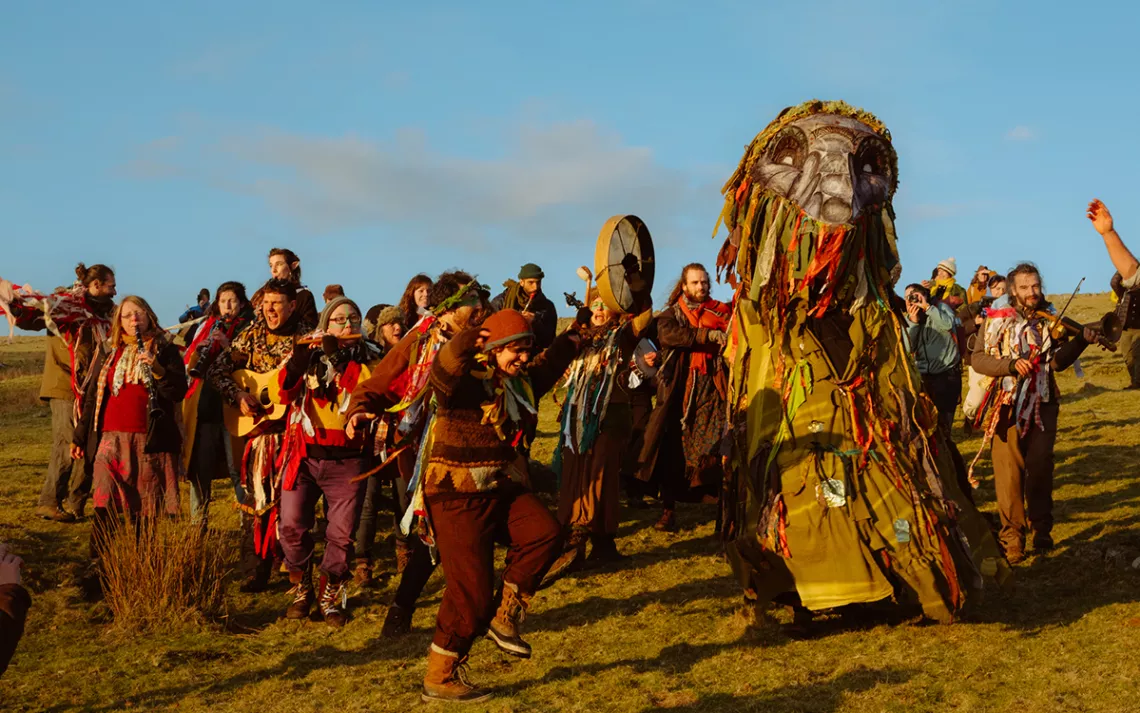Why the UK’s Wild Camping Protests Matter
Public land access is an urgent, and global, issue

Photos by Josh Greet
On January 13, in a landmark court ruling, the English public lost the right to wild camp in their country. Wild camping is when backpackers pitch their tents on open countryside without a landowner’s permission, and Dartmoor, a national park in southwest England that’s one-tenth the size of Yellowstone, had been the last place in the country the ancient practice was permitted. The decision on the case, which was brought by wealthy Dartmoor landowner Alexander Darwall, hasn’t gone down well.
In recent weeks, thousands of people have come out to protest land rights on a scale not seen since the 1930s, reinvigorating existing campaigns calling for improved public access to England’s countryside. Protesters’ discontent reflects widespread feelings that the present Conservative administration, which is mired in scandals of cronyism and nepotism, governs for the benefit of entrenched wealth and privilege. But the protests point to a wider problem too, both in the UK and around the world.
In England and Wales, the right to walk freely across common land—often privately owned yet retaining historical and legal access for non-owners, or “commoners”—exists on a dismally low 8 percent of the countryside. The need for better access to England’s most inspiring landscapes came into sharp focus during pandemic lockdowns, and, as in the United States, disproportionately impacts marginalized groups. The governmental organization Natural England has estimated that just 1 percent of national park visitors come from Black, Asian, and minority ethnic backgrounds. In the United States, just 22 percent of national park visitors are non-white. Given the consensus that spending time in the natural world improves health and well-being, efforts to limit access anywhere should matter to us all.

“In a world of steel, glass, and concrete, of stress, ecological detachment and screen-based lifestyle, the countryside is a natural health service that can heal us,” wrote the access-advocacy campaign Right to Roam on their website. I have lived within Dartmoor National Park for 25 years, and I count myself fortunate. Here I can hike all day, encountering scarcely a solitary soul across wild, boggy, heather-dashed moorland whose hills are capped by granite towers, called tors. There are few defined footpaths, so I can roam extensively across its 123,000 acres. Navigating by map and choosing my own route nurtures a sense of confidence and freedom.
Lingering in its wilds overnight, for me, is something akin to spiritual; I relish self-sufficiency, and paring life back to its basest necessities of food, sleep, and warmth. It feels like a communion with nature. Pitching my small tent out of sight by a dark stone hilltop called Fur Tor, I drink chilled water tinted by the peaty tannins from a nearby brook. After a one-pot meal cooked on a camp stove, I wish for starry skies, although more often, in Dartmoor’s pea-soup mists, I settle for the hoots of unseen owls and trilling nightjars.
This freedom isn’t happenstance. Back when it was passed, in 1985, the Dartmoor Commons Act was viewed as a model agreement, balancing public need for recreation with local economic activity. But Darwall, a self-made millionaire wielding a smart lawyer, argued the right to wild camp never actually existed at all, contending that camping isn’t a form of recreation.
A week after the ruling, 3,000 demonstrators marched across Darwall’s land. By then, the grievance had escalated beyond wild camping. Protesters called for opening an English countryside still dominated by large aristocratic estates, where access, if any, is typically restricted to linear footpaths. Concern has also emerged about wealthy individuals leveraging the law to fight public access. “We’re not seeing land physically fenced-in, but a public right being turned into a private commodity and removed at the drop of a hat if the landowner so desires. It’s a dangerous precedent,” says Lewis Winks, one of the protest organizers.

The protest recalls a 1932 act of mass trespass that helped the English people secure better public land access in the first place. A century ago, the urban working class had few options when seeking recreation and unpolluted air. To protest that, some 400 people trespassed upon a moorland plateau called Kinder Scout, clashing with gamekeepers employed by a titled, absentee landowner. Five were arrested and jailed, but their actions helped spur the 1949 National Parks and Access to the Countryside Act.
In England, we are fortunate to have a robust judicial process and critical press coverage of decisions like the Dartmoor wild camping ban. That’s not always the case. In some global communities, from Indigenous Amazonian people dispossessed by logging to Maasai tribe members evicted from traditional lands now earmarked for conservation and tourism, threats to access often leave locals with little recourse.
Even in the US, home to the world’s first national park, historical land access isn’t safe. Some 15 million acres of federal public land in the USA are entangled or encircled by private land, sometimes making it impossible to reach public areas without stepping across a foot or two of someone’s property. In Wyoming, private landowners have argued that this public land, in essence, should become off-limits for the Americans whose tax dollars pay for it. A civil suit on the issue, with sweeping implications for America’s outdoor enthusiasts and researchers alike, begins in the Wyoming Supreme Court in June 2023.
Back in the moorland of southern England, Dartmoor National Park has announced it will appeal the ruling banning free wild camping. The opposition Labour Party, meanwhile, says it would reverse the wild camping ban, then go still further, bringing in a bill to extend access rights more broadly. In Britain, some hope that one wealthy landowner’s desire to control traditionally accessible lands will result, ironically, in greater access for all. I hope so—and that America, and the world, can follow suit.
 The Magazine of The Sierra Club
The Magazine of The Sierra Club



